新概念英语第二册第8课
- 格式:ppt
- 大小:688.00 KB
- 文档页数:42
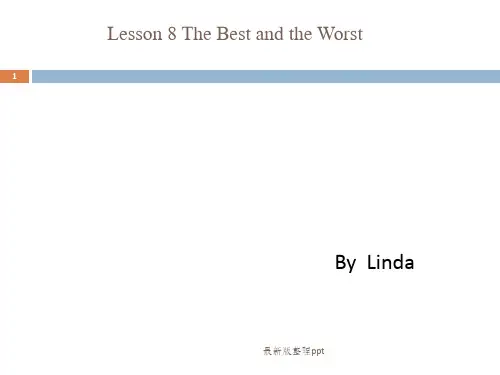
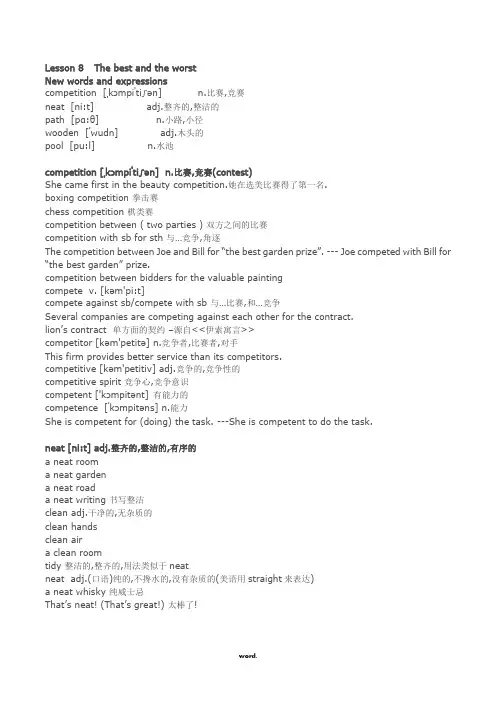
Lesson 8 The best and the worstNew words and expressionscompetition [ˌkɔmpiˈtiʃən] n.比赛,竞赛neat [ni:t] adj.整齐的,整洁的path [pɑ:θ]n.小路,小径wooden [ˈwudn] adj.木头的pool [pu:l] n.水池competit ion [ˌkɔmpiˈtiʃən] n.比赛,竞赛(contest)She came first in the beauty competition.她在选美比赛得了第一名.boxing competition 拳击赛chess competition 棋类赛competition between ( two parties ) 双方之间的比赛competition with sb for sth 与…竞争,角逐The competition between Joe and Bill for “the best garden prize”. --- Joe competed with Bill for “the best garden” prize.competition between bidders for the valuable paintingcompete v. [kəm'pi:t]compete against sb/compete with sb 与…比赛,和…竞争Several companies are competing against each other for the contract.lion’s contract单方面的契约–源自<<伊索寓言>>competitor [kəm'petitə] n.竞争者,比赛者,对手This firm provides better service than its competitors.competitive [kəm'petitiv] adj.竞争的,竞争性的competitive spirit 竞争心,竞争意识competent ['kɔmpitənt] 有能力的competence [ˈkɔmpitəns] n.能力She is competent for (doing) the task. ---She is competent to do the task.neat [ni:t] adj.整齐的,整洁的,有序的a neat rooma neat gardena neat roada neat writing 书写整洁clean adj.干净的,无杂质的clean handsclean aira clean roomtidy 整洁的,整齐的,用法类似于neatneat adj.(口语)纯的,不搀水的,没有杂质的(美语用straight来表达)a neat whisky 纯威士忌That’s neat! (That’s great!)太棒了!path [pɑ:θ] (footpath)市镇中间,住宅之前或田野中穿越田地,沿路有标志的人行道lane [lein]1) 乡间小径a narrow country lane2) 各自的跑道 (田径场上),保龄球球道3) overtaking lane (高速公路上的)超车道road 路,道路,公路country road 乡村小路by road= by car or by busAll roads lead to Rome. 条条大路通罗马.track1) (走得多而形成的路;跑道;轨道)track events 径赛项目a single track 单轨a double track 双轨2) (车辆,人,动物等行走时留下的)踪迹,足迹,痕迹tire tracks 轮胎的轨迹keep track of sb/sth 与某人/某事保持联系on the right track 做得对track and field 田径赛be on the track of a person 追赶,追踪某人street 街,街道(美国指东西走向的街道)His address is 155 Smith Street.avenue ['ævənju:] 大街 (美国指南北走向街道);林荫大道(Br)the Fifth avenue 第五大道wooden [ˈwudn] adj.木头的wood [wud]1) 木,木材(不可数名词)Tables are usually made of wood2) woods 森林(不如forest 大)go for a walk in the woods 在森林中散步3) 柴禾 firewood; chop woodCannot see the wood for the trees. 只见树木,不见森林.knock on the wood (touch wood)西方人的一种迷信,说完好运后,敲木头,以免好运溜走. adj. 1) 木制的a wooden bridge over a pool2) 举止行为僵硬而笨拙的a wooden smilea wooden performancewooden spoon 最后一句,末等奖I get the wooden spoon in “the Nicest Garden Competition” every year.born with a silver spoon in one’s mouth生于富贵之家woody [ˈwʊdi:] adj.木材的,木质的,象木头的pool [pu:l]1) 水池,水坑,水塘swimming pool 游泳池pond 池塘(尤指供牲口饮水或作为花园之装饰)a fish pond 养鱼池lake 湖2) 合伙投资We bought a computer by the pool.我们合伙买了一台电脑.Key Structures形容词,副词的比较级和最高级英语中的形容词,副词,表示”比较”和”最”这样的概念时,用特别的形式称为比较级和最高级. 有两种基本构成方式:第一种是单音节的adj.或adv.变比较级或最高级直接加er或esthot---hotter---hottesttall---taller-tallestlarge—larger—largest另外一种是多音节的(三音节及以上的)adj.或adv.变比较级或最高级前面加more或most. interesting-more interesting—most interestingbeautiful-more beautiful—most beautiful双音节的形容词,副词的比较级,最高级变化:A. 以-ble, -y, -ly, -er, -ow结尾的双音节词,后加er,est.noble—nobler—noblestable—abler—ablestpretty—prettier—prettiestearly—earlier—earliestclever—cleverer---cleverestnarrow—narrower—narrowestB. 其它双音节词前加more,mostmore helpfulmore careful还有一些比较特殊,如:good/well-better-bestbad/ill-worse-worstmany/much-more-mostlittle-less-leastfar-father/further-farthest/furthest当表示路很远,距离更远,是具体的远,能测出尺度的,这时用farther,farthest;表示更进一步,更深入的,表示一种抽象的含义时,用further,furthest;further study 深造学习further questions 更进一步的问题old-older-oldest 表示普通含义更老一些,更旧一些,用older,oldest;old-elder-eldest 表示有血源关系的,年龄更长的,最年长的,用elder,eldest.1) 形容词的比较级用来表示”比…多(少)一些”时,通常用than来表示,than引起的状态从句来表示和什么相比,为了避免重复,从句中有些成分可以活力,只把相比部分突出来,如:Prevention is better than cure.(谚)预防胜于治疗;宜未雨绸缪.There are fewer boys than girls in our class.It takes less time to go there by bus than by boat.Are you feeling better?I had never seen a better film.2) 形容词的最高级在使用时,前面通常要加定冠词the, 并有一个短语或从句表示在哪个范围的情况如此. Autumn is the best season here.It was the cheapest hotel we could find.That was the most delicious meal I have ever had.但在作表语的形容词最高级前,如果不是和别人相比,常常不加定冠词.We are busiest on Tuesdays.Vegetables are best when they are fresh.3) 比较原则:A. 比较对象对等一致原则It’s warmer in Wuhan than Shanghai. (wrong)---It’s warmer in Wuhan than in Shanghai. (right)Bill Frith’s garden is larger than Joe’s.There are more students in our class than in your class.B. 排除自身去比较He is the tallest.He is taller than anyone. (wrong)---He is taller than anyone else.Wuhan is hotter than any other city.Exercise: 用of或in填空1. Which is the longest river (in) the world?2. This is the finest picture (of) them all.3. This stereo is the most expensive (of) all the ones in the shops.4. He is the best boxer (in) our town规律:当表示最高级时,比较范围如果是比较地点,用in 来表达;比较平等对象之间,用of来表达.in the worldof them allof all the onesin our townTextJoe Sanders has the mos t beautiful garden in our town. Nearly everybody enters for “The Nicest Garden Competition” each year, but Joe wins every time.Bill Frith’s garden is larger than Joe’s. Bill works harder than Joe and grows more flowers and vegetables, but Joe’s garden i s more interesting.He has made neat paths and has built a wooden bridge over a pool. I like gardens too, but I do not like hard work. Every year I enter for the garden competition too, and I always win a little prize for the worst garden in the town!乔.桑德斯拥有我们镇上最漂亮的花园。
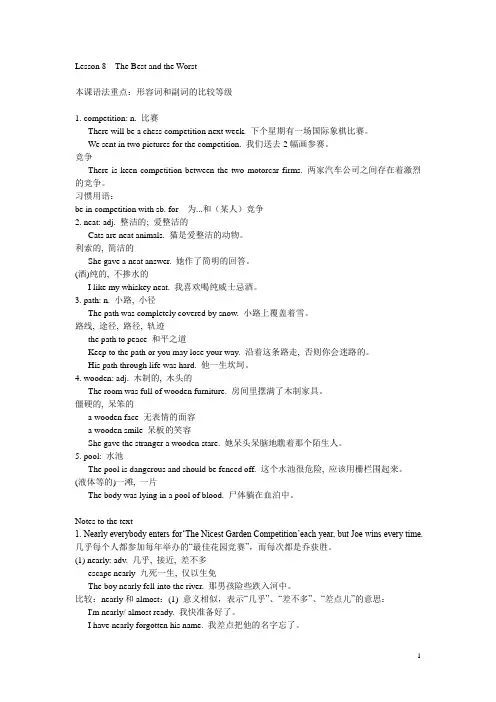
Lesson 8 The Best and the Worst本课语法重点:形容词和副词的比较等级1. competition: n. 比赛There will be a chess competition next week. 下个星期有一场国际象棋比赛。
We sent in two pictures for the competition. 我们送去2幅画参赛。
竞争There is keen competition between the two motorcar firms. 两家汽车公司之间存在着激烈的竞争。
习惯用语:be in competition with sb. for 为...和(某人)竞争2. neat: adj. 整洁的; 爱整洁的Cats are neat animals. 猫是爱整洁的动物。
利索的, 简洁的She gave a neat answer. 她作了简明的回答。
(酒)纯的, 不掺水的I like my whiskey neat. 我喜欢喝纯威士忌酒。
3. path: n. 小路, 小径The path was completely covered by snow. 小路上覆盖着雪。
路线, 途径, 路径, 轨迹the path to peace 和平之道Keep to the path or you may lose your way. 沿着这条路走, 否则你会迷路的。
His path through life was hard. 他一生坎坷。
4. wooden: adj. 木制的, 木头的The room was full of wooden furniture. 房间里摆满了木制家具。
僵硬的, 呆笨的a wooden face 无表情的面容a wooden smile 呆板的笑容She gave the stranger a wooden stare. 她呆头呆脑地瞧着那个陌生人。
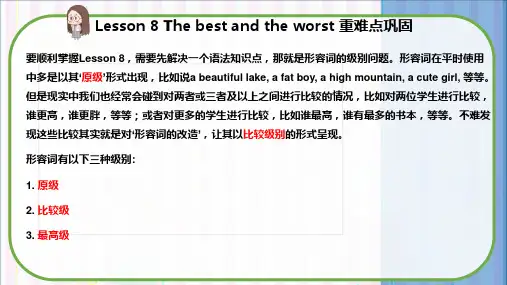
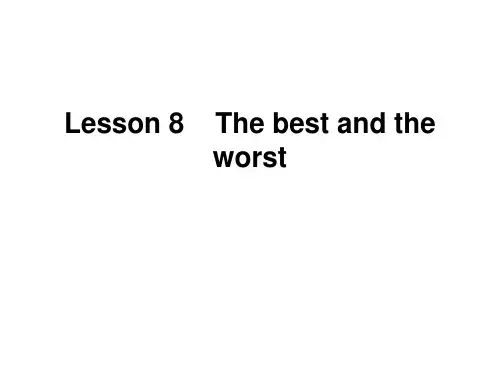
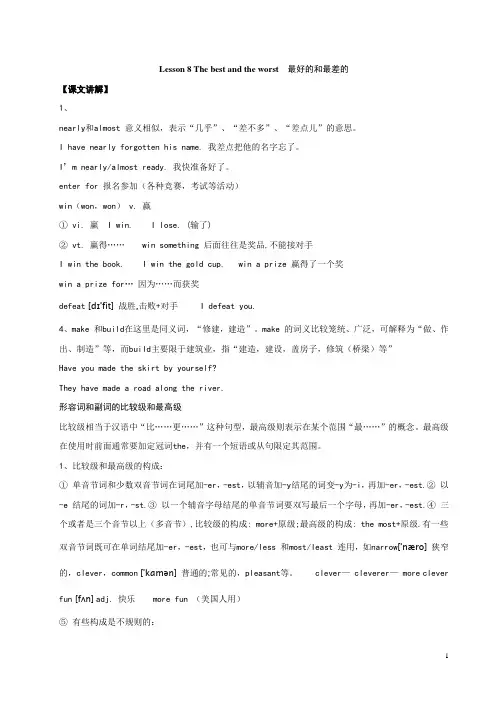
Lesson 8 The best and the worst 最好的和最差的【课文讲解】1、nearly和almost 意义相似,表示“几乎”、“差不多”、“差点儿”的意思。
I have nearly forgotten his name. 我差点把他的名字忘了。
I’m nearly/almost ready. 我快准备好了。
enter for 报名参加(各种竞赛,考试等活动)win(won,won)v. 赢①vi. 赢I win. I lose. (输了)②vt. 赢得……win something 后面往往是奖品,不能接对手I win the book. I win the gold cup. win a prize 赢得了一个奖win a prize for…因为……而获奖defeat [dɪ'fit]战胜,击败+对手I defeat you.4、make 和build在这里是同义词,“修建,建造”。
make 的词义比较笼统、广泛,可解释为“做、作出、制造”等,而build主要限于建筑业,指“建造,建设,盖房子,修筑(桥梁)等”Have you made the skirt by yourself?They have made a road along the river.形容词和副词的比较级和最高级比较级相当于汉语中“比……更……”这种句型,最高级则表示在某个范围“最……”的概念。
最高级在使用时前面通常要加定冠词the,并有一个短语或从句限定其范围。
1、比较级和最高级的构成:①单音节词和少数双音节词在词尾加-er,-est,以辅音加-y结尾的词变-y为-i,再加-er,-est.②以-e 结尾的词加-r,-st.③以一个辅音字母结尾的单音节词要双写最后一个字母,再加-er,-est.④三个或者是三个音节以上(多音节),比较级的构成: more+原级;最高级的构成: the most+原级.有一些双音节词既可在单词结尾加-er,-est,也可与more/less 和most/least 连用,如narrow['næro]狭窄的,clever,common ['kɑmən]普通的;常见的,pleasant等。
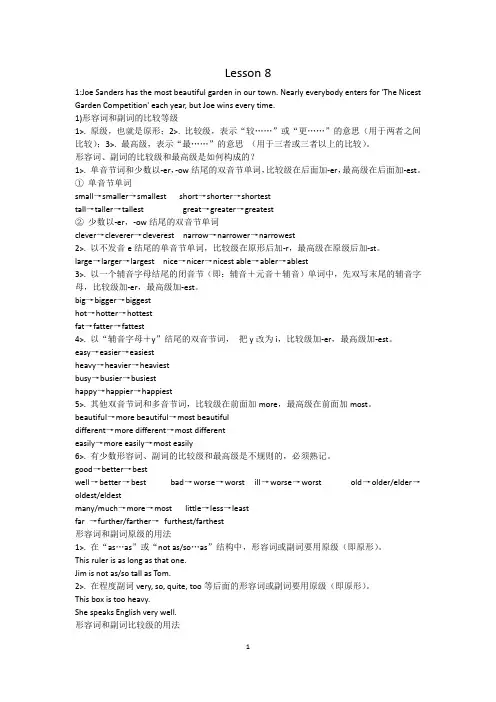
Lesson 81:Joe Sanders has the most beautiful garden in our town. Nearly everybody enters for 'The Nicest Garden Competition' each year, but Joe wins every time.1)形容词和副词的比较等级1>. 原级,也就是原形;2>. 比较级,表示“较……”或“更……”的意思(用于两者之间比较);3>. 最高级,表示“最……”的意思(用于三者或三者以上的比较)。
形容词、副词的比较级和最高级是如何构成的?1>. 单音节词和少数以-er,-ow结尾的双音节单词,比较级在后面加-er,最高级在后面加-est。
①单音节单词small→smaller→smallest short→shorter→shortesttall→taller→tallest great→greater→greatest②少数以-er,-ow结尾的双音节单词clever→cleverer→cleverest narrow→narrower→narrowest2>. 以不发音e结尾的单音节单词,比较级在原形后加-r,最高级在原级后加-st。
large→larger→largest nice→nicer→nicest able→abler→ablest3>. 以一个辅音字母结尾的闭音节(即:辅音+元音+辅音)单词中,先双写末尾的辅音字母,比较级加-er,最高级加-est。
big→bigger→biggesthot→hotter→hottestfat→fatter→fattest4>. 以“辅音字母+y”结尾的双音节词,把y改为i,比较级加-er,最高级加-est。
easy→easier→easiestheavy→heavier→heaviestbusy→busier→busiesthappy→happier→happiest5>. 其他双音节词和多音节词,比较级在前面加more,最高级在前面加most。

新概念英语第二册第8课课文详解及语法解析课文详注 Further notes on the text1.Nearly everybody enters for 'The Nicest Garden Competition' each year, but Joe wins every time. 几乎每个人都参加每年举办的“花园竞赛”,而每次都是乔获胜。
(1)nearly和almost 意义相似,表示“几乎”、“差不多”、“差点儿”的意思:I'm nearly/ almost ready.我快准备好了。
I have nearly forgotten his name.我差点把他的名字忘了。
He nearly missed the train.他差点没赶上火车。
(2)each和every均可译为“每一个”,二者常常能够互相代替使用:Every/ Each time I wash the car it rains.每次我擦洗汽车,天总是下雨。
但是each更强调个体。
它常用以指一个确定的并通常是有限的数目:Each child in the school was questioned.学校里的每个孩子都被询问过了。
every却不那么强调个体,常用来指一个大的、不确定的数目:Every child enjoys Christmas.所有的/每个孩子都喜欢过圣诞节。
另外,each既能够作形容词又能够作代词,但every只能作形容词:They each have a share.他们每人都有一份。
Each of us has his own work to do.我们每个人都有自己的工作要干。
2.Bill Frith's garden is larger than Joe's. 比尔·弗里斯的花园比乔的花园大。
名词加-'s表示所属关系,构成名词的所有格。
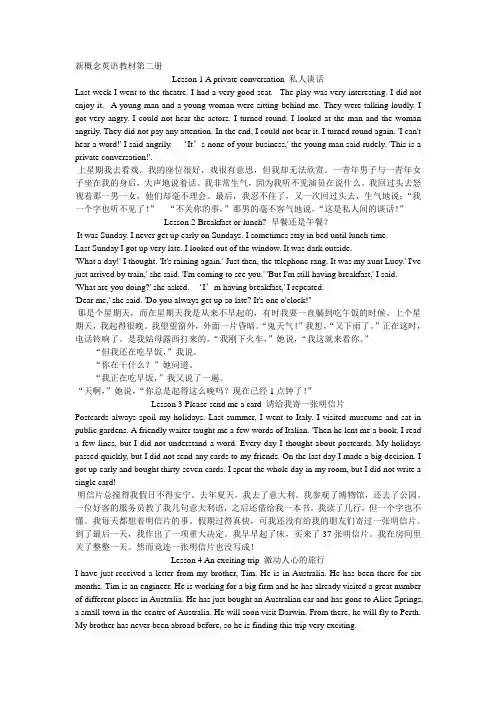
新概念英语教材第二册Lesson 1 A private conversation 私人谈话Last week I went to the theatre. I had a very good seat. The play was very interesting. I did not enjoy it. A young man and a young woman were sitting behind me. They were talking loudly. I got very angry. I could not hear the actors. I turned round. I looked at the man and the woman angrily. They did not pay any attention. In the end, I could not bear it. I turned round again. 'I can't hear a word!' I said angrily. ‘It’s none of your business,' the young man said rudely. 'This is a private conversation!'.上星期我去看戏。
我的座位很好,戏很有意思,但我却无法欣赏。
一青年男子与一青年女子坐在我的身后,大声地说着话。
我非常生气,因为我听不见演员在说什么。
我回过头去怒视着那一男一女,他们却毫不理会。
最后,我忍不住了,又一次回过头去,生气地说:“我一个字也听不见了!”“不关你的事,”那男的毫不客气地说,“这是私人间的谈话!”Lesson 2 Breakfast or lunch? 早餐还是午餐?It was Sunday. I never get up early on Sundays. I sometimes stay in bed until lunch time.Last Sunday I got up very late. I looked out of the window. It was dark outside.'What a day!' I thought. 'It's raining again.' Just then, the telephone rang. It was my aunt Lucy.' I've just arrived by train,' she said. 'I'm coming to see you.' 'But I'm still having breakfast,' I said.'What are you doing?' she asked. ‘I’m having breakfast,' I repeated.'Dear me,' she said. 'Do you always get up so late? It's one o'clock!''那是个星期天,而在星期天我是从来不早起的,有时我要一直躺到吃午饭的时候。
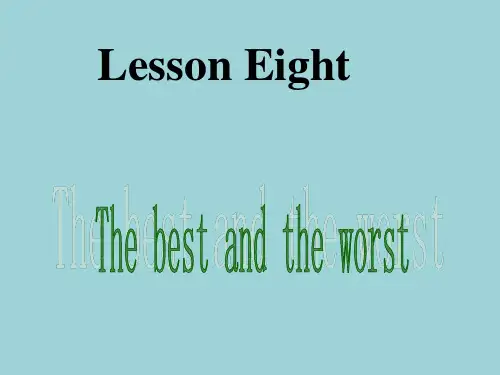
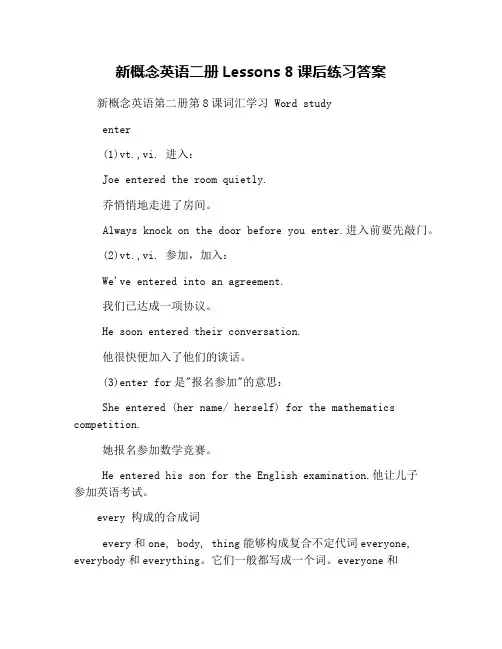
新概念英语二册Lessons 8课后练习答案新概念英语第二册第8课词汇学习 Word studyenter(1)vt.,vi. 进入:Joe entered the room quietly.乔悄悄地走进了房间。
Always knock on the door before you enter.进入前要先敲门。
(2)vt.,vi. 参加,加入:We've entered into an agreement.我们已达成一项协议。
He soon entered their conversation.他很快便加入了他们的谈话。
(3)enter for是"报名参加"的意思:She entered (her name/ herself) for the mathematics competition.她报名参加数学竞赛。
He entered his son for the English examination.他让儿子参加英语考试。
every 构成的合成词every和one, body, thing能够构成复合不定代词everyone, everybody和everything。
它们一般都写成一个词。
everyone和everybody一般能够替换使用,后面的代词既能够用单数,也能够用复数,但它们本身均被视为单数:Everyone/ Everybody knows what he has to do.每一个人都知道自己必须做什么。
Everyone/ Everybody knows what they have to do.每个人都知道自己必须做什么。
Everything is going well.一切都很顺利。
与every一样能够构成这类合成词的单词还有some, any和no。
新概念英语第二册第8课练习答案 Key to written exercises1.关键句型练习答案A 1 Mary's handwriting is worse than Jane's.2 Caroline's handwriting is worse than Mary's and Jane's.3 Caroline's dress is/ was more expensive than Jane's.4 Mary's dress is/ was more expensive than Jane's and Caroline's.B …has the most beautiful garden in our town…'The Nicest Garden Competition'…garden is larger thanJoe's…works harder than Joe and grows more flowers and vegetables…garden is more interesting…for the worst garden in the town!D 1 in 2 of 3 of 4 in2.难点练习答案A 1 believes 2 was 3 triesB Sentences 2, 3 and 53.多项选择题答案1 d2 b3 b4 a5 c6 c7 b 8 b 9 a 10 d 11b 12 b。
新概念英语第二册第7-8课Lesson 7 Too lateRevision:other, the other, another, others, the otherspeople like to stay at home, but ________ like to go to the cinema.A. anotherB. otherC. othersD. other one答案: C. (要牢记: some…., others….)Is this your shoe-- Yes, but where is _________A. the other oneB. other oneC. another oneD. the others答案: A. (注意鞋是两只, another指的是三者或者三者以上)has gone to _________ city and he'll be back in a week.A. otherB. the otherC. anotherD. any other答案:C (注意这里没有说只有两座城市,因此不能选B.)4.– What do your parents do-- One is a teacher; _________ is a driver.A. otherB. anotherC. the otherD. that one5. Her lecture was hard to follow because she kept jumping from one subject to _________.A. otherB. the otherC. the othersD. another6. ─ Do you want cake (2005浙江省金华市)─ Yes, I usually eat a lot when I'm hungry.A. otherB. othersC. anotherD. the other7. I don't like this shirt, so I want to see some .(04宁夏)A. otherB. the otherC. othersD. another8. Shanghai is larger than city in India. (04黄冈)A. any otherB. otherC. all otherD. any注意:any other表示“同一范围内,除了自己以外的”,后接单数名词。
新概念英语第二册课堂笔记:第8课Lesson 8 The best and the worst★New words and expressions☆competition n.比赛,竞赛所有的比赛都能够通称为competition速度比赛:race eg.car race球赛:match eg.football matchcontest用的更多,除了以上的比赛,都能够说contest 选美比赛就是beauty contest还有game,如果把上面的都忘了,就用这个☆neat adj.整齐的,整洁的不等于clean,等于tidy☆pool n.水池pool是人工的,游泳池:swimming pool天然的叫池塘:pond★本课重点是比较级和级※三个或者三个音节(元音音标)以上的词:多音节词:比较级的构成:more+原级,级的构成:the most+原级※单音节的词用er,est※双音节:不一定一般情况,同单音节以y结尾的+er,例外:slowly-more slowly-the most slowlyoften-more often-the most oftenclever-cleverer-cleverest和clever-more clever-the most clever都对技巧:长的当多音节,短的当单音节,但仅仅是技巧哦fun按照语法应该是funner,funnest,可老美偏偏说more fun,the most fun。
如果考语法,中国人全对,美国人错的一塌糊涂,英国人对一半。
所以老美是不会拿自己的弱点来考我们的。
无规律:good-better-best;bad-worse-worst;many/much-more-most;little-less-leastfar-farther-farthest;far-further-furthestfarther:距离上的更远;further:水准上的old-older-oldest;old-elder-eldestolder是比……大;elder做定语修饰其它名词:elder sister★TextJoe Sanders has the most beautiful garden in ourtown.Nearly everybody enters for 'The Nicest Garden Competition' each year,but Joe wins every time.Bill Frith's garden is larger than Joe's.Bill works harder than Joe and grows more flowers and vegetables,but Joe's garden is more interesting.He has made neat paths and has built a woodenbridge over a pool.I like gardens too,but I do not like hard work.Every year I enter for the garden competition too,and I always win a little prize for the worst garden in the town!☆enter for:报名参加,只强调报名eg.enter for the exam参加:take part in☆win-won-wonvi.I win.我赢了。
新概念英语第二册第8课:The best and the worstLesson 8 The best and the worst最好的和最差的听录音,然后回答以下问题。
Why is Joe's garden the most beautiful one in the town?Joe Sanders has the most beautiful garden in our town.乔.桑德斯拥有我们镇上最漂亮的花园。
Nearly everybody enters for 'The Nicest Garden Competition' each year, but Joe wins every time.几乎每个人都参加每年举办的“最佳花园竞赛”,而每次都是乔获胜。
Bill Frith's garden is larger than Joe's.比尔.弗里斯的花园比乔的花园大Bill works harder than Joe and grows more flowers and vegetables, but Joe's garden is more interesting.他比乔也更为勤奋,种植的花卉和蔬菜也更多,但乔的花园更富有情趣。
He has made neat paths and has built a wooden bridge over a pool.他修筑了一条条整洁的小路,并在一个池塘上架了一座小木桥。
I like gardens too, but I do not like hard work.我也喜欢花园,但我却不愿意辛勤劳动。
Every year I enter for the garden competition too, and I always win a little prize for the worst garden in the town!每年的花园竞赛我也参加,但总因是镇上最劣的花园而获得一个小奖!New words and expressions 生词和短语competitionn. 比赛,竞赛neatadj. 整齐的,整洁的pathn. 小路,小径woodenadj. 木头的pooln. 水池Notes on the text课文注释1 Joe Sanders has the most beautiful garden in our town.乔·桑德斯拥有我们镇上最漂亮的花园。